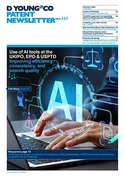UPC Court of Appeal decides members of public require representation to request access to documents
In a recent order the Unified Patent Court (UPC) Court of Appeal has ruled that a member of the public requesting access to documents must be represented by a professional representative. This is a development which forms part of the ongoing saga around transparency and access to documents at the UPC.
As reported in our article, published 21 December 2023 “Transparency of UPC proceedings: Court of Appeal to rule on “reasoned requests” for file access” the Nordic-Baltic regional division ordered access to the statement of claim (after redaction of personal data) following a request for access under Rule 262.1(b) of the UPC Rules of Procedure. The request was made by a member of the public and concerned the case of Ocado v Autostore.
Related article
“Transparency of UPC proceedings: Court of Appeal to rule on “reasoned requests” for file access”, published 21 December 2023.
Read moreOcado appealed the order and the oral hearing is set for 12 March 2024.
As a side issue to the appeal on access to documents, the UPC Court of Appeal considered the issue of representation under Rule 8.1 of the UPC Rules of Procedure and has ruled that a member of the public requesting access to documents must be represented.
Rule 8.1 of the UPC Rules of Procedure requires that a party to proceedings at the UPC must be represented unless the Rules of Procedure provide otherwise. The central question to be decided upon by the court was thus whether or not a member of the public requesting document access is to be treated as a party within the meaning of Rule 8.1 of the UPC Rules of Procedure.
In this regard, the court noted that Article 47 of the UPC Agreement refers to a party only in the context of actions made before the UPC, which according to Article 32 of the UPC Agreement do not include applications other than actions. However, the court reasoned with reference to opt-outs and decisions subject to appeal, that the definition of a party in Rule 8.1 of the UPC Rules of Procedure must nonetheless be wider than defined in Article 47 of the UPC Agreement. In other words, the situations in which representation is required is not limited to actions made before the UPC.
In particular, the court noted that opt-out procedures are not defined as actions under Article 32 of the UPC Agreement, and yet applicants are expressly excluded from the requirement for representation by Rule 5.4 of the UPC Rules of Procedure, implying that these applicants should be considered parties with the meaning of Rule 8.1 of the UPC Rules of Procedure. The court similarly noted that a party in Rule 220.1 of the UPC Rules of Procedure, which sets out which decisions of the UPC may be subject to appeal, has a wider meaning. In this rule the term party applies to third parties adversely affected by a decision or order of the court, including a third party under Rule 190 and a member of the public making a request for document access under Rule 262.1(b) of the UPC Rules of Procedure.
The court thus concluded that all applicants of any application or action before the UPC are required to be professionally represented, unless this requirement is explicitly waived by the Rules of Procedure. Since no such exemption exists for applicants under Rule 262.1(b) of the UPC Rules of Procedure, the court held that the member of the public in Ocado v Autostore will require representation in the appeal proceedings, and indeed should have been represented before the Court of First Instance. The court commented that it did not find this requirement for representation to be “unnecessarily burdensome”, and furthermore considered members of the public filing a request for document access to be in an adversarial situation where professional representation would be appropriate.
The Court of Appeal’s order makes clear that, in general, applicants for any application or action before the UPC will require professional representation. This requirement would appear to place a reasonably significant barrier in the way of members of the public seeking access to pleadings or evidence, despite the relatively permissive regime for document access expected to develop following the Court of Appeal’s subsequent decision in Ocado v Autostore.
UK-based European Patent Attorneys have full rights of representation before the UPC, there being no nationality or residence requirement to act as a representative. D Young & Co is therefore able to provide professional representation for parties seeking to access documents relating to UPC proceedings. Please contact your usual D Young & Co representative for further information.
Case details at a glance
Decision level: Court of Appeal, Luxembourg
Case number: UPC_CoA_404/2023
Date: 08 February 2024
Judgement type: Order
Parties: Ocado Innovation Limited / Respondent
Type of action: Appeal under UPC Rules of Procedure 220.2



